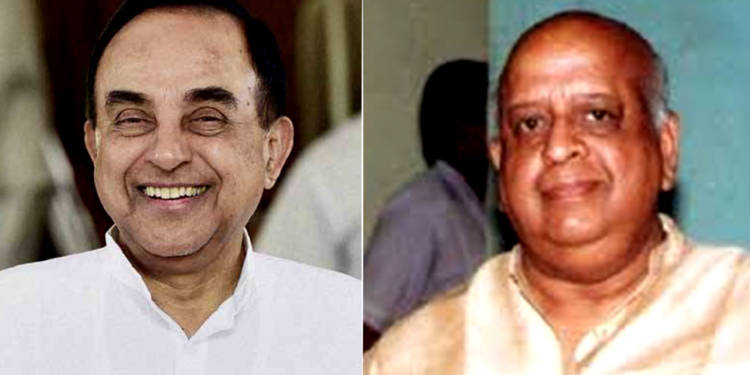On November 10, T N Seshan, former Chief Election Commissioner passed away at the age of 86. Seshan, who headed the statutory body from 1990 to 1996, was instrumental in cleaning up the electoral process in the country. Seshan was an IAS officer of 1955 batch from Tamil Nadu cadre and held the Cabinet Secretary in Rajiv Gandhi government.
The man who played a key role in Seshan’s appointment as Election Commissioner is Subramanian Swamy- India’s foremost crusader against corruption. Seshan himself accepted Swamy’s role and was ‘grateful’ for the opportunity given to him by the firebrand BJP leader.
Seshan’s interview to Business Standard in 2013 notes, “According to Seshan, the then law minister, Janata Party leader Subramanian Swamy, played a vital role in the appointment, for which Seshan says he is still grateful. His association with Swamy goes back to Harvard University, where the government had sent Seshan to do a course in public administration, and Swamy was then teaching.”
Swamy was the senior-most minister in Chandrasekhar’s government (1990-1991) and held a dual portfolio of Law and Justice as well as Commerce and Industry. Seshan’s relationship with Swamy goes back to late 1960s when he was on Edward S. Mason Fellowship to earn a master’s degree in public administration from Harvard University and Swamy was the Professor of Economics at University. Both belonged to the Southern Brahmin community and were obsessed with Indian politics and public policy.
Seshan never tried to hide that Swamy was instrumental in his appointment as Chief Election Commissioner. When a journalist asked him ‘how he could be a fair referee in a situation where he was judging Swamy’s Janata Party and its symbol and whether there was a conflict of interest in it, Seshan replied, “I will let you decide on that.”
Swamy’s wife- Roxna Swamy, in the autobiographical book Evolving with Subramanian Swamy: A Roller Coaster Ride, elaborately discusses Swamy’s lifelong friendship with Seshan.
Seshan managed to stamp his authority on the country’s electoral system as the country’s 10th Chief Election Commissioner. His strict commandments were: no bribing or intimidating voters, no distribution of liquor during the elections, no use of official machinery for campaigning, no appealing to voters’ caste or communal feelings, no use of religious places for campaigns and no use of loudspeakers without prior written permission.
He also enforced the Model Code of Conduct, strictly monitored limits on poll expenses and cracked down on several malpractices like wall graffiti. The issuance of Voter IDs for all eligible voters came into being under his strict watch.
In 1994, in a move that sent shockwaves through the political establishment, he denounced the then Welfare Minister Sitaram Kesari and Food Minister Kalpnath Rai for attempting to influence voters and asked the then PM to remove the two from office. There was a talk at the time whether the CEC had overstepped his brief by offering such unsolicited advice to the government.
Subramanian Swamy has played an important role in India’s anti-corruption drive and brought many cases against many prominent politicians from across the political spectrum. His crusade against in 2G spectrum scam, coal allocation scam, exposing crooked Gandhi family and their coterie P Chidambaram are well known. But, Swamy’s instrumental role in fighting against corruption in elections, is not well known. One must be thankful to Subramanian Swamy for cleaning of India’s politics and the electoral process.



























